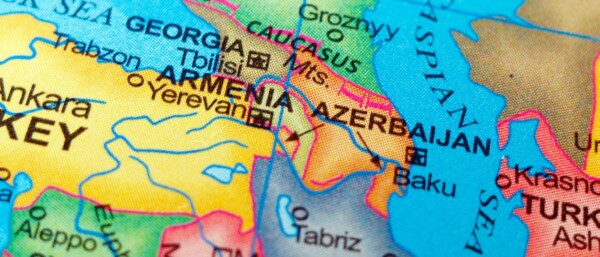
Driving change through skills development in the EECAN region
The Eastern Europe and Central Asia (EECAN) region is on a path of transformation, with developing economies projected to grow by 3.3% in 2024 (World Bank). This steady progress is unlocking new opportunities across various sectors, with the development of human talent at the heart of this transformation. Equipping people with the right skills is essential not only to bridge existing gaps but also to reinvigorate economic growth across the region.
From enhancing vocational training to driving economic inclusion, we’ve supported the region by exporting solutions that prepare workforces for the future and drive meaningful change. As recognised Export Champion for the Department for Business and Trade, here we share our experiences to help others explore opportunities and navigate challenges in the EECAN region.
Our work across the region
Every region we work in offers its own set of opportunities and complexities. In EECAN, our focus has been on tailoring solutions to meet the diverse needs of its countries and industries.
- Economic and social inclusion: Promoting gender equality, access to education and the integration of marginalised groups into the workforce are vital to unlocking the full potential of these economies. In Moldova, we tailored work-based learning programmes to help marginalised communities enter the labour market, while in Georgia, we supported the creation of sectoral skills organisations to drive sustainable growth. By addressing these critical barriers, we have helped drive inclusive economic development that benefits individuals and businesses.
- Revolutionising TVET policies and strategies: A key focus of our work has been strengthening education systems by aligning technical vocational education and training (TVET) with industry needs. In Kazakhstan and Mongolia, we conducted in-depth evaluations of TVET programmes, helping to enhance their relevance to industry demands, while in Uzbekistan, we extended our impact by building skills for the tourism sector, providing capacity building for government organisations and establishing industry-specific academies such as the Meros Academy. Through these collaborations with governments and local organisations, we have helped shape policies and strategies that promote dynamic education and workforce ecosystems.
- Capability and capacity building: Building local expertise and leadership is crucial for ensuring sustainable, long-term growth. In Turkey, our youth inclusion programme for the tyre manufacturing industry provided specialised training to create employment opportunities and build a skilled and diverse workforce. Similarly in Armenia, we established sector-specific skills development centres that serve as critical hubs for training and innovation. By aligning training with industry needs in both countries, we’ve expanded local capacity, introduced global standards and empowered young people, ensuring these industries remain competitive and resilient.
- Globally recognised skills solutions: Education is a bridge between aspiration and opportunity. By offering globally recognised training programmes, we’ve helped regions maximise workforce potential. In Azerbaijan, we designed bespoke traineeship and apprenticeship programmes that connect education with employment, creating valuable opportunities for young professionals. In Ukraine, we contributed to event-driven skills development by tailoring volunteer customer service programmes for the Eurovision Song Contest. Through these initiatives, we’ve helped regions unlock new opportunities while ensuring that skills development aligns with both local and global demands.
Tips for overcoming challenges and seizing opportunities in the EECAN region
Expanding into the EECAN region presents both unique challenges and opportunities. Here are some key lessons learned from our experience that can help others looking to export their expertise to the EECAN market:
- Build strong local partnerships: Language and cultural diversity across the region can present communication challenges, especially in countries where English is not widely spoken. With numerous languages and dialects spoken across the region, effective communication is often challenging. Establishing strong, trusted partnerships with local organisations is essential for effective collaboration. These partnerships not only bridge communication gaps and navigate cultural nuances but also play a critical role in building local capacity for long-term sustainability. By equipping local partners with the tools and knowledge needed to continue initiatives independently, you create solutions that are deeply embedded and capable of delivering lasting impact.
- Understand local market needs and regulatory landscapes: Each country in the EECAN region has its own set of market dynamics, legal frameworks and industry standards. Understanding these local variations is crucial for aligning your products or services with local demands while meeting global benchmarks. This might include adapting your offer to meet local regulations, customer preferences or industry practices. Conducting thorough market research and engaging with local experts can help you navigate these complexities, ensuring your products or services are well-received and compliant with regulations.
- Stay flexible in the face of political and economic instability: Political instability and shifting economic conditions are challenges that can arise in some parts of the region. Economic downturns, changes in government or regulatory changes may disrupt progress. Staying flexible and maintaining strong relationships with local partners will help you adapt to these changes. Having a contingency plan in place and staying engaged with local networks and partners will allow you to manage risks and continue delivering your products or services effectively.
- Adapt proven models to meet local needs: One of the most exciting prospects is the adoption and tailoring of successful UK models. The region has shown significant interest in replicating proven strategies, providing a platform to share expertise and help shape robust, industry-aligned systems. By adapting models from other regions, you can introduce products or services that address market gaps and align with regional development goals.
- Leverage government support: Expanding into any new region can be complex, but support from networks such as the Department for Business and Trade (DBT), the British Council and local embassies can provide valuable guidance. These organisations offer insights, resources, and connections that can help you navigate the region’s unique challenges and expand your reach. Taking advantage of these networks can help you build credibility and gain a deeper understanding of the regional landscape.
To learn more about our work or explore partnership opportunities, get in touch with us today.



